
Bernar Venet
“I could stand in the middle of Fifth Avenue and shoot someone and I wouldn’t lose any voters.”
Donald Trump (January 23, 2016)
“But why did the hero of the tragedy have to suffer, and what was the meaning of his ‘tragic’ guilt? We will cut short the discussion by a prompt answer. He had to suffer because he was the primal father, the hero of that primordial tragedy the repetition of which here serves a certain tendency, and the tragic guilt is the guilt which he had to take upon himself in order to free the chorus of theirs.”
Sigmund Freud (Totem and Taboo)
“This simplicity corresponds to the position taken by the music towards its theme: it is the position of the highly entertained observer of fair-ground scenes…”
Theodor Adorno (on Stravinsky, from Philosophy of Modern Music)
I wanted to look at a quality I find in contemporary society which I find somewhat inexplicable. And that is the (seemingly growing) passivity of the masses in the face of authority. I watched a video yesterday of a brutal crack down on peaceful protesters in the Netherlands by Dutch police. It was wholly disproportionate. And I wondered at why none of the police officers voiced restraint. Now this is a rhetorical question, to a degree. But we could also look at ICE agents across the US violently zip tying innocent people, punching them and throwing them into police vans. None of those arrested have been proven to be guilty of anything. Or Trump’s policy of bombing small boats off the coast of Venezuela. This is blatantly illegal. And in all cases mentioned there has been some push back, but its not sustained (at least that I can tell). Western society has been deeply conditioned to accept authority. But how does that work?
“Freud does not share with Le Bon his reactionary contempt for the mass movements of the time. And this neutral attitude leads him to a far deeper understanding of its mechanism of formation: the cement that keeps them together is a specific type of libidinal tie, that is narcissistic identification. The member of the mass can identify with one another as members of the same group because they have substituted one and the same object, which is the image of the leader, as their ego ideal. They are, so to speak, equal in the image of the leader. This, in turn, explains why the leader has to appear as the big narcissist and why he can actually do so while appearing as a rather average person.”
Chiara Bottici (Adorno with Freud, Adorno Beyond Freud)
Bottici is writing on Freud’s Group Psychology and the Analysis of the Ego, as well as Adorno’s essay on fascist propaganda. Adorno makes an important observation early on his essay, and that is about the character of the fascist leader.
“In order to explain the first aspect, narcissism, Adorno quotes Freud, once again, who stated that “the leader himself need love no one else.” But then rephrases the same sentence by saying that “the leader can be loved only if he himself does not love.”
Chiara Bottici (Ibid)

Yasuko Hirano
This is a crucial aspect of what creates the conditions of passivity in an authoritarian society. And I would argue this inability to love goes even deeper than Adorno suggests. This is the post internet age inability to ‘feel’. Trump is, it does need to be noted, only a more open version of Biden or Obama or Clinton or Bush. But it is this lack of disguise that also qualitatively changes the affect and meaning of his authoritarianism. For Freud the head of mass movements is the psychological equivalent of the Father in the Primal Horde. And a word here on what some critics of Freud (in particular of his anthropological writing) call a ‘just so story’. The answer is, it doesn’t matter if its a ‘just so story’. It probably is, in one sense, but that doesn’t mean its not right. More on this below. So, in contemporary society the role of the Father has waned, both literally and figuratively. But the nature and quality of this ‘waning’ needs to be investigated a bit more.
“The category of ‘phoniness’ applies to the leaders as well as to the act of identification on the part of the masses and their supposed frenzy and hysteria. Just as little as people really believe in the depth of their heart that the Jews are the devil, do they completely believe in their leader. They do not really identify themselves with him but acts this identification, perform their own enthusiasm, and thus participates in their leader’s performance. It is through this performance that they strike a balance between their continuously mobilized instinctual urges and the historical stage of enlightenment they have reached, and which cannot be revoked arbitrarily. It is probably the suspicion of this fictitiousness of their own ‘group psychology’ which makes fascist crowds so merciless and unapproachable.”
Theodor Adorno (Freudian Theory and the Pattern of Fascist Propaganda)
The performance of self, the performance of their own enthusiasm. This is critically important. And it begs question of belief that take us back to the Enlightenment and Nietzsche. And here I will mention again that this is now the age of quantum physics. And that in turn means western society cannot escape the ideas of non Christian belief and cosmology.

Julije Knifer
“Psychological dispositions do not actually cause fascism: rather, fascism defines a psychological area which can be successfully exploited by the forces which promote it for entirely non-psychological reasons of self-interest.”
Theodor Adorno (Ibid)
Fascism is, so the old Marxist adage goes, the response of Capitalism to a crisis. It is there to rescue capitalism. And I have written on this several times, so I wont belabour it here. The point is, that today the form that rescue takes is more like a controlled demolition.
“…instead of the anodyne static and perennial personality types that were circulating in the psychology of the time, critical theory began developing an American, sanitized version of Carl Schmitt’s friend-enemy theory through a reformulation of the already operative social scientific distinction between in-group and out-group. In order to make Schmitt’s theory available to social psychology, it was necessary to read behind his friend-enemy formula. One plausible interpretation of Schmitt’s master concept is to consider it as a political reconstruction of the relation between love and hate.”
Jay M. Bernstein (Adorno’s Uncanny Analysis of Trump’s Authoritarian Personality. 2017)
I hasten to point out again that Schmitt is Peter Thiel’s favorite philosopher. And let me segue here to something I mentioned last post and last podcast; Walter Benjamin’s essay (really just notes FOR an essay) titled Capitalism as Religion.
“Benjamin’s critique is not aimed thus at religion in itself (for example, as “opium of the people”), but rather at a certain structure, probably heathenish, which brings together capitalism and the “so-called” religions of the past. This structure, Benjamin writes, presents three main characters, which will then become four (we must remember that these are work notes, and thus Benjamin must have come up with the fourth trait when drafting them). capitalism is a cultic religion, with no dogma and no theology, that is, pure ritual; . this cult is perpetual and knows no pauses; . it is a cult that does not offer redemption but instead produces Schuld, in its double signification of “guilt” and “debt”. The God of this cult is involved in the guilt/debt and thus is kept hidden.”
Carlos Salzani (False Religions and True Politics)

Dr. Ahmed Matern (mixed media, photography)
Now, Benjamin does not lay out anything like a full theory here, but he makes some incisive points. The idea of debt looms over all this and sadly Benjamin never really returned to this idea vis a vis capital.
“The first operative term of this characterization is undoubtedly “cult,” from which in a certain sense the other three features derive. A cult that raises the earning of money to a religious rite, that needs no ideological legitimization (it has neither dogmatics nor theology), but justifies itself merely through its own functioning, and that actualizes itself in the form of a
utilitarianism that takes up a sacred connotation: everything takes on a meaning only, and immediately (unmittelbar), in relation to the utilitarian cult, which means that what is not deemed as “useful” takes on almost “sacrilegious” traits. Capitalism thus does not demand adhesion to a creed; it is the actions themselves, the everyday practice, that take on a cultic character.”
Carlos Salzani (Ibid)
Debt and guilt almost become one. Salzani adds “The relationship between money and guilt within pagan religions already contains the “demonic ambiguity” of a guilt that is in itself always already debt. The capitalist cult, as guilt-inducing/debt-inducing, belongs to the sphere of pagan religions and, with its universalization of guilt/debt, drives back humanity into a “demonic stage”;…”
This is not readily obvious at all, but here I suspect Freud would have something to say. And Benjamin does note the automatic adherence to follow the logic of capital if embedded within its framework.
“In the second essay of his On the Genealogy of Morality (published in 1887), titled “‘Guilt’, ‘bad conscience’ and related matters,” Nietzsche already states that “the main moral concept ‘Schuld’ (‘guilt’) descends from the very material concept of ‘Schulden’ (‘debts’),” and genealogically traces back the origin of the moral concepts of guilt, conscience, and duty to the sphere of the law of obligations. It is “the contractual relationship between creditor and debtor, which is as old as the very conception of a ‘legal subject,’” that is the basis of the normative construction of Western ethics, “and itself refers back to the basic forms of buying, selling, bartering, trade and traffic.” Guilt would therefore be the condition of those who feel indebted. Moreover, Nietzsche relates the greatness of the concept of god and divinity to the “feeling of indebtedness [Schulden] towards a deity,” to the point that “The advent of the Christian God as the maximal god yet achieved, thus also brought about the appearance of the greatest feeling of indebtedness [Schuldgefühl] on earth.”
Carlos Salzani (Ibid)

Morgan Fisher
“Christianity with its cultus of abstract man, more especially in its bourgeois developments, Protestantism, Deism, &c, is the most fitting form of religion” for a society based upon the production of commodities.”
Karl Marx (Capital, vol.1)
Now Benjamin sees Freud, Marx, and Nietzsche as, somewhat ironically, high priests of capitalism. For they mimetically reproduce the exchange structure of capitalism. One senses that Benjamin wanted to write a book on this, more on politics than religion, actually and many scholars (Uwe Steiner for one) expressly maintain this. And one senses, too, the truth of ‘repressed as capital’. Its just impossible to really quite grasp this idea.
“As for Freud, Benjamin argues that the “repressed,” the foundation of psychoanalytic theory, equates, for an analogy that he does not develop, to capital. This analogy is nonetheless related to the generating of interests in capital, in turn assimilated to the repression of the “idea of sin” (GS VI:101/SW 1:289). As it has been pointed out, above all in Totem and Taboo, and more precisely in the myth of the primal horde that concludes the chapter “The Return of Totemism in Childhood,” Freud places at the origin not only of religion, but of social organization tout court, the original guilt (Urschuld) for the murdering of the father. This is “the same great event with which civilization began and which, since it occurred, has not allowed mankind a moment’s rest,” an event that organizes the social structure at all levels: “Society [is] now based on complicity in the common crime; religion [is] based on the sense of guilt [Schuldgefühl] and the remorse attaching to it; while morality [is] based partly on the exigencies of this society and partly on the penance demanded by the sense of guilt.” For Freud, this structure is ultimately a more or less rational way of managing the Schuldgefühl, which is and remains ineliminable. The Freudian diagnosis, therefore, is also unable to free humanity from the logic of guilt and indebtedness, but rather reinforces it and places it as the foundation of all social, religious, and political systems, and thus absolutizes it.”
Carlos Salzani (Ibid)
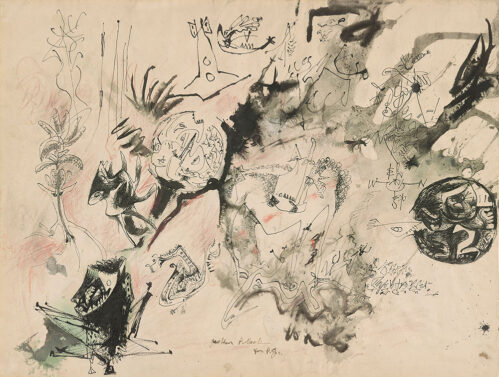
Jackson Pollock (1943)
This idea of usefulness is worth talking about, again. Americans are very proud of this idea of ‘american progamatism’. And progress itself is, of course, based on utility and efficiency. And it was Adorno who said art’s radicalness came out of its ‘uselessness’. And this in turn leads to a discussion of ‘communication’.
“In the “permanent worship” of capitalism, the pursuit of utility is not, as it were, separate from that which has no other purpose than itself. Instead, it manifests itself in all of its “uselessness.” If it can be said that the search for useful and uniquely identifiable purposes is naturally inscribed in man, in an autotelic move that constitutes its essential premise, the same activity emerges in capitalism as a single continuous motion that no longer has purpose or ends. In the capitalist forms of production, like a party that knows no rest, what is achieved is an uninterrupted veneration of what is useful to human life. But the satisfaction of needs ends up becoming a form of indebtedness for its own sake.”
Elettra Stimilli (The Debt of the Living)
Durkheim points out something else…
“It is then possible to understand the close affiliation of the religious with the recreational or the aesthetic element, with play or the work of art, and that which, in human life, is “without purpose” and that takes place “only for the mere pleasure of affirming itself;” ultimately, all that is involved in “supplementary and superfluous works of luxury”. (Durkheim Elementary Forms of Religious Life) .
Elettra Stimilli (Ibid)
Between the 19th and 20th centuries there were myriad historical studies on the evolution of Christianity, but also on its origins specifically, and a search for its *essence*. This was a time when science was an emergent discipline — and the idea of core principles was growing in importance. It was a time when a belief in breaking things down into ever smaller parts made sense. The sense was somewhere, eventually, we find an essence. There were a lot of comparative studies as well, with Hindusim or Buddhism or Judaism. The studies of ‘religion’ per se were mostly Christian based (Mauss, Durkheim, the Collège de Sociologie) and the general consensus was that religious experience did not require extrinsic goals. It was a kind of self sufficient project.
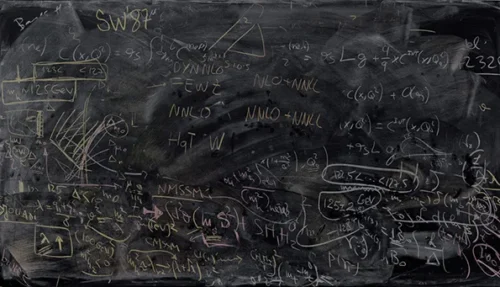
Alejandro Guijarro, photography (from book on physicists blackboards)
“In religion and its various expressions, humankind experiences its actions as ends in themselves. This proves an essential part of the practice of renunciation in asceticism and is manifested as a form of power with an end in itself that is capable of constraining human action.”
Elettra Stimilli (Ibid)
And then toward the end of the 19th century came Nietzsche. And Kierkegaard. And Marx. And then Freud. These were in varying ways what Ricour called ‘masters of suspicion’. There was, by the end of WW1, more or less, a kind of deep suspicion adhering to ‘belief’. The trenches will do that. No atheists in fox holes, but no true believers returning from the western front. Then there was Einstein and general relativity. And everything quantum suddenly shifted belief, although it took many decades for these new paradigms to become social currency. Breaking things down into ever smaller parts broke through the world of visual perception and instituted another reality altogether.
But Durkheim saw religion as sufficient unto itself. However as Adorno was to extensively examine the ‘promise’ of art and culture. (of which I have devoted, probably, seven or eight blog posts over the years). This was intimately connected to the dialectic of the Enlightenment — the promise, the desire for progress as a measure of meaning and the counter trends in Puritanical America that distrusted anything not materially productive. And it has always struck me as ironic (or close to ironic) that many Marxists of the ‘factory Marxist’ persuasion, that this hostility to culture was to take such cult like characteristics.
Benjamin clearly grasped the front edges of this by calling Capitalism itself a cult. As a secondary theme in this is the very idea of the *sacred*. And here is where, I think, Durkheim and others start to go astray. For trying to catalogue the sacred is just a solipsistic cul de sac. It is a bit like recent discussions about consciousness from neuroscientists. The very act of defining is almost a quantum puzzle. Its like a logical wave function collapse (to really stretch a point). The unseen world of particle physics, never mind quantum physics, presents problems for conventional religious belief.

Olaf Otto Becker, photography (Siberia)
I have said before that early man, painting on the walls of caves, began with theatre and not religion. The stage of the mind is both having performances of things seen and heard and felt in the world around it, but also is recreating subjective stories of the formation of its own consciousness. The stage, all stages, are the site of the primal crime.
“The inadequacy of classicism of any persuasion originates in its repression of this element; a repression that art must mistrust. The progressive spiritualization of art in the name of maturity only accentuates the ridiculous all the more glaringly; the more the artwork’s own organization assimilates itself to a logical order by virtue of its inner exactitude , the more obviously the difference between the artwork’s logicity and the logicity that governs empirically becomes the parody of the latter; the more reasonable the work becomes in terms of its formal constitution, the more ridiculous it becomes according to the standard of empirical reason. Its ridiculousness is, however, also part of a condemnation of empirical rationality; it accuses the rationality of social praxis of having become an end in itself and as such the irrational and mad reversal of means into ends . The ridiculous in art, which philistines recognize better than do those who are naively at home in art, and the folly of a rationality made absolute indict one other reciprocally;…{ } The ridiculous, as a barbaric residuum of something alien to form, misfires in art if art fails to reflect and shape it. If it remains on the level of the childish and is taken for such, it merges with the calculated fun of the culture industry . By its very concept, art implies kitsch, just as by the obligation it imposes of sublimating the ridiculous it presupposes educational privilege and class structure; fun is art’s punishment for this.”
Theodor Adorno (Aesthetic Theory)
And this is why intentional ‘spiritualizing’ in artworks always fails. And it is exactly this failure that haunts 90% of Hollywood ‘Prestige’ product today. On some level all great works should bore you, at least for part of the time. Art (as I have said before) is not your friend. It is an antagonist. But it is an authentic antagonist. It is not performing the role of antagonist.

Kaz Oshiro
One other thinker explored Benjamin’s unfinished essay, Giorgio Agamben.
“ According to Benjamin, capitalism does not represent only, as in Weber, a secularization of the Protestant faith, but is itself essentially a religious phenomenon, which developed in a parasitical way from Christianity. As such, as the religion of modernity, it is defined by three characteristics. 1. It is a cultic religion, perhaps the most extreme and absolute that has ever existed. Everything in it has meaning only with reference to the carrying out of the cult, not with respect to a dogma or an idea. 2. This cult is permanent, it is “the celebration of a cult ‘sans trêve et sans merci’ [without truce or mercy]”. In it, it is not possible to distinguish between feast days and working days, but rather there is a single, uninterrupted day of feast-labor, in which labor coincides with the celebration of the cult. 3. The capitalist cult is not directed at redemption or expiation of guilt, but at guilt itself. “Capitalism is probably the first instance of a cult that creates guilt, not atonement… A vast sense of guilt that is unable to find relief seizes on the cult, not to atone for this guilt but to make it universal…to the point where God, too, finally takes on the entire burden of guilt…[God] is not dead; he has been incorporated into the destiny of humanity.”
Giorgio Agamben (Creation and Anarchy: The Work of Art and the Religion of Capitalism)
Capitalism is a parasite system that attached itself to Christianity. Its a bit like a tick. Agamben writes that capitalism is a religion, a faith, that has no object. You believe in believing (in credit). But here is where its useful to remember that coinage is pure abstraction. Its value is elsewhere. Capitalism is a religion in which God is also elsewhere. My nickel is worth five cents — but that’s abstract. The coin has no use value. Its a symbol.
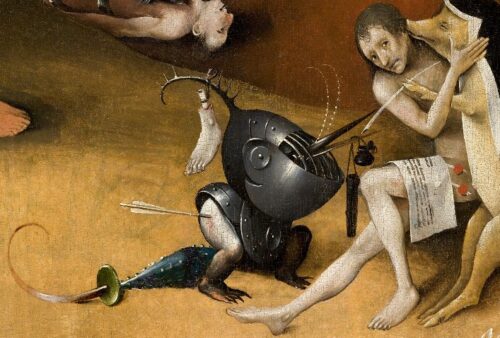
Hieronymus Bosch (Garden of Earthly Delights, detail)
Francis Coppola once said to me (during a strange evening I spent at his Sonoma winery, with a dozen others including Barbet Schroeder and Paul Theroux) that ‘you are only rich if you owe a LOT of money’. Of course I think he was off his meds at the time, but point taken. The fear of fictitious capital was a hallmark of the Patriarchal capitalism of the 19th century. Agamben makes special note of Nixon’s 1971 removal of the Gold Standard.
“The process of money’s dematerialization had begun many centuries earlier, when the demands of the market led to introducing letters of exchange, banknotes, juros, “Goldsmith’s notes,” and so forth, alongside metallic money, which was necessarily scarce and cumbersome. All these forms of paper money are actually titles of credit and for this reason are called fiduciary money. ”
Giorgio Agamben (Ibid)
Credit.
“I ask myself at times how it is possible that people so tenaciously keep their faith in the capitalist religion. Because it is clear that if people ceased to have faith in credit and stopped living on credit, capitalism would immediately collapse. It seems to me, however, that I am catching a glimpse of some signs of an incipient atheism with respect to the credit God.”
Gioegio Agamben (Ibid)
This was a bit like my question regards state violence. A bit.
“the spectacle is the money which one can only look at, because in the spectacle the totality of use has been exchanged for the totality of abstract representation.”
Guy Debord (Society of the Spectacle)
Agamben notes the deterioration of language. There is nothing material to talk about, only the representation of things. So people today let AI do their talking. And Grok or whatever ‘ap’ one uses, is just cutting and pasting generalized gibberish. And I think people unconsciously know or intuit that AI systems can be made to say whatever it is they want it to say. (a side bar observation here: it might well be that some people, the affluent classes will pay the pauperized to ‘talk for them’. The surplus population as human AI systems. Like those African slave children who stood in dressars waiting to offer cigars to the guests on the tray they held. And at that point nobody is listening anyway and the resistance forms around the secret codes of human corporeal AI).
Truth is irrelevant. In the quantum world everything is relative and everything disappears anyway.
The idea of progress has stalled, too. One does not know any longer what society is meant to be progressing toward. The sense of impermanence — of rules that keep changing like the sub atomic world — means even lineage feels unstable. Legacy feels counterfeit and the goal for this abstract *progress* is disconnected from traditional morality.

American dog tick (Dermacentor variabilis)
“Some primaeval relic of humanity is at work which we can now scarcely reach any longer by a direct path.…we may expect that the analysis of dreams will lead us to a knowledge of man’s archaic heritage, of what is psychologically innate in him. Dreams and neuroses seem to have preserved more mental antiquities than we could imagine possible; so that psycho-analysis may claim a high place among the sciences which are concerned with the reconstruction of the earliest and most obscure periods of the beginnings of the human race.”
Sigmund Freud (The Interpretation of Dreams)
The quantum revolution changed ideas of progress as it called into question the linear aspect of time.
“But it is in every sphere of experience that capitalism attests its religious character and, at the same time, its parasitical relation with Christianity. Above all with respect to time and history. Capitalism has no telos; it is essentially infinite yet, precisely for this reason, incessantly in prey to a crisis, always in the act of ending. But in this too it attests its parasitical relationship with Christianity. Responding to David Cayley, who asked him if ours is a post-Christian world, Ivan Illich claimed that ours is not a post-Christian world, but the most explicitly Christian world that has ever existed, namely, an apocalyptic world.”
Giorgio Agamben (Ibid)
Agamben then makes a rather profound observation.
“There is a phrase, pronounced by one of the four villains in Pasolini’s Salò, which says: “The only true anarchy is the anarchy of power.” In the same sense Benjamin had written many years before: “Nothing is so anarchic as the bourgeois order.” I believe that their suggestion must be taken seriously. Benjamin and Pasolini here grasp an essential characteristic of capitalism, which is perhaps the most anarchic power ever to exist, in the literal sense that it can have no archē, no beginning or foundation. But in this case as well the capitalist religion shows its parasitical dependence on Christian theology.”
Giorgio Agamben (Ibid)
Capitalism is, then, not quite a religion. It is the anti-religion. There is no redemption. Now others have noted how quantum physics often resembles early Vedic writings. At least the cosmological part of it. The story physicists give to their math is very close to various early Indian philosophies (Hinduism is, strictly speaking, what westerners call Indian philosophy and religion).

Luca Zanier, photography.
Capitalism is both cult and anti-religion. There is no question the nearly non existant nature of capitalist redemption is a defining aspect — but I think a return to this idea of sacredness and spirituality is in order. And Heidegger (of all people) makes a pretty insightful set of notes on ‘spirit’ (in a less known essay of his, surprisingly. An essay written in 1945, in the wake of German defeat in WW2. And only published posthumously ).
“Holderlin says: “For us everything is concentrated on the spiritual, we have become poor in order to become rich.” We can only understand the content and the implications of this statement when we know what Holderlin thinks when he says “the spiritual.” The “spiritual” is indeed that which is determined from out of the spirit “and” by the spirit. But what is “the spirit”? A long tradition of thinking has various answers ready for this question. It is said: spirit is the opposite of matter. Contrasted with the material, the spiritual is the immaterial. But this determination of the spirit and the spiritual is stuck in a mere negation of matter and the material. { } The immaterial is the pneumatic and the spiritual. It means: spirit is the effective power of enlightenment and wisdom…{ } In the Christian Church’s theological-philosophical speculation concerning the unitariness of God, this substance-akin essence the spirit was carefully thought out. Consequently, Augustine’s work, De Trinitatae became decisive for the Western Roman Church as a different development occurred in the Oriental Church and particularly in Russia where the doctrine of holy Sophia was unfolded. This doctrine is even today alive in the Russian mysticism in a manner that we can hardly imagine. The efficacy of the spirit as the all pervading power of enlightenment and wisdom (Sophia) is “magical.” The ownmost of the magical is as inscrutable and opaque as the ownmost of the pneumatic. Yet, we know that Jacob Bohme, the theosophist and philosopher – the shoemaker from Gorlitz, who from all the shoemakers was called the most quiet one – had recognized the magical in the light of the shoemaker’s globe and thought of it as the primal will. Bohme’s doctrine of the divine Sophia (theosophy) was known in Russia as early as the seventeenth century. { } Jacob Bohme as the holy father of the Church. In Russia, at the beginning of the nineteenth century, a renewal of Jacob Bohme’s influence came about simultaneously with the strong influence of Hegel and Schelling involving Vladimir Solovyov. It is thus no exaggeration when I say that what one nowadays conceives shortsightedly and incompletely as merely “political” or even roughly “political” and calls Russian Communism comes from a spiritual world about which we know hardly anything, even if we totally overlook the fact that we already forget to think the manner in which even Materialism taken roughly as the forefront of Communism is not itself something material, but rather something spiritual coming from a spiritual world (hat can only be experienced in and out of the spirit if its truth and untruth are to be “fulfilled.”
Martin Heidegger (Poverty)

Robert Campin (Prometheus Unbound, detail. 1429)
This is an excellent note on Russian communism: its RUSSIAN. And this is a very different culture from the West. I lived in Poland for years, and even there (and Poles are NOT Russians) I got a hint at the curiously deep and folkloric sensibility of most Russians. That is meant as a compliment, by the way. Russians are spiritual is a very mature and *old* way. If the U.S. is immature and modern. Central Europe …mittleuropa, is Kafka and Hungarian men’s shoes and Vienna and Slovakian castles (or caves). Mitteleuropäische is the culture that is not Russian but not quite European. The sense of Western (north American mostly) ideas of progress and futurism was never found in Czechoslovakia or Romania or Serbia. And this is an interesting fact. And National Socialism, then, was both German (it certainly made use of German myth and history) and western — almost preternaturally American. It was puritanical in a sense, it was certainly anal and sado/masochistic. Italian fascism was comparatively vulgar in comparison. But the point here is that it is not an accident that Operation Paperclip was implemented so seamlessly. The U.S. was already its own version of National Socialism. It was also British to a not insignificant degree. The British empire helped build modern fascism.
“The qualitative difference between art and science does not simply consist in using the latter as an instrument for knowing the former. The categories employed by science stand in so obtuse a relation to the inner-artistic categories that their direct pro jection onto the extra-aesthetic categories inevitably wipes out what the investigation was supposed to explain. The growing relevance of technology in artworks must not become a motive for subordinating them to that type of reason that produced technology and finds its continuation in it.”
Theodor Adorno (Ibid)
What would Adorno have said of the internet age.
So finally, Capitalism as religion means global capitalism has created a giant Jonestown, in which we currently reside. Jim Jones promised salvation, however. Today, that has been removed. Drink the cool aid. Why? Just fucking drink it! This is what Benjamin saw.
Jim Jones
“The apparatuses of the media aim precisely at neutralizing this profanatory power of language as pure means, at preventing language from disclosing the possibility of a new use, a new experience of the word. Already the church, after the first two centuries of hoping and waiting, conceived of its function as essentially one of neutralizing the new experience of the word that Paul, placing it at the center of the messianic announcement, had called ‘pistis’, faith. The same thing occurs in the system of the spectacular religion, where the pure means, suspended and exhibited in the sphere of the media, shows its own emptiness, speaks only its own nothingness, as if no new use were possible, as if no other experience of the word were possible.”
Giorgio Agamben (Profanations)
Agamben goes on to cite pornography as the final frontier of the unprofanable. Whether that is true or not (I think he simplifies this rather profoundly) the media today is a sort of giant church of coercive affect. Today’s media is not possible without first destroying language (or trying to, and mostly succeeding) . The recovery of language is one of the primary goals of any resistance.
The theory of general relativity altered ideas of reality — certainly of history, and of ‘faith’. Of spirit, and while there is a progressive aspect to that, the lack of progress, by its own terms, has resulted in a post quantum crisis of meaning. There is a growing chorus of physicists claiming quantum mechanics is wrong. Claiming that something in all this math cannot be right and therefor the stagnation in ‘progress’. Gerard’t Hooft, a Nobel laurate in physics, speaks of (among other things) the theory of superposition (aka Schrödinger’s cat), and he calls it nonsense.
“If you look very carefully, things never superimpose. [Erwin] Schrödinger asked the right questions here: You know, take my cat, it can be dead; it can be alive. Can it be in a superposition? That’s nonsense!”
Gerard’t Hooft (interview Scientific American)

Stephen Weinberger, photography.
But that idea, that ‘story’ is appealing, and gave birth to a thousand memes. Its spooky. But even I said a while back the problem with that idea begins with language, or rather with the story itself. The story is much less appealing if you say, we cannot know if the cat is alive or dead until we look at it. You can add that this act of looking, at a sub atomic level, is rather more complicated (and math dependent) that opening a shoe box. But basically that is the problem. Add to this the fact that when Einstein wrote his theory of general relativity there were probably a few hundred serious theoretical physicists around (and Einstein wasn’t one of them). Today there are perhaps a million worldwide. The pursuit became a profession (as someone said).
Colliders cost billions of dollars — last one I believe cost forty billion, in fact. My point here is that not only has physics hit a wall, but it has hit an expensive wall. When Heidegger writes that Communism is spiritual, he is not denying the material, but pointing out that spirit has been, since Descartes, the definition of self consciousness. It is that thing that exceeds the materialistic. The world of theoretical science is no closer to defining consciousness than it has ever been.
Allow me another quote from the Heidegger essay, because it illustrates why philosophy is important to science..
“The dictum “for us everything is concentrated upon the spiritual” is not a historical identification of a fact pertaining to the situation of that time, but a thinking poetizing invocation of an enowning that is hidden-sheltered in be-ing itself – an enowning reaching out into what is coming from afar and intimated by only a few, or perhaps only by the one who can say and think that enowning. What follows the first part of the dictum, namely “we have become poor, in order to become rich,” has the same character of a poetic statement as the first part, namely “for us everything is concentrated upon the spiritual.” What does “poor” mean? In what does the ownmost of poverty consist? What does “rich” mean, if only in and through poverty we are to become rich? According to the ordinary meaning, “poor” and “rich” pertain to possession, to having wealth. Poverty means not having and being specifically deprived of what is needed. Wealth means not being deprived of what is needed; it means a having that surpasses what is needed. The ownmost of poverty, however, lies in the singular be-ing (beruht in einem Seyn). To be truly poor means to be so that one is deprived of nothing except what is not needed. To be truly deprived means not being able to be without what is not needed and thus immediately and exclusively belonging to what is not needed.”
Martin Heidegger (Ibid)
Nature is viewed classically as material. And yet nothing is ever fully material. And that is because consciousness experiences it. Ours or somebody else’s. The stagnation of quantum physics is partly the result of its neglect (nearly total neglect) of philosophy. This in another register is why politics is also so barren and denuded today. And here one would have to introduce Wittgenstein, I think. For Wittgenstein is, paradoxically perhaps, the most spiritual of philosophers in the 20th century.
Christian Marclay
In an interview Bill Childs (Wittgenstein scholar) writes: ” I think we can distinguish three levels of hostility in Wittgenstein’s remarks about science and scientism. There is hostility to the scientism that treats science as the only respectable form of enquiry and ignores the value of other kinds of investigation. There is hostility to the spirit in which contemporary science is conducted, which Wittgenstein thinks is the spirit that informs western civilization as a whole. { } Now for the second level of Wittgenstein’s hostility: his objection to the spirit of ‘the typical western scientist’ (Culture and Value, p, 7). Science, he writes, is driven by a commitment to making progress, to ‘onwards movement [and to] building ever larger and more complicated structures’; it involves an endless quest for novelty, ‘add[ing] one construction after another, moving on and up, as it were, from one stage to the next’ (Philosophical Remarks p. 7). Science values knowledge only as a means to an end. And ‘the spirit in which science is carried on nowadays’, he complains, is incompatible with a sense of wonder at nature: ‘Man has to awaken to wonder . . . Science is a way of sending him to sleep again’ (Culture and Value, p. 5).”
Bill Childs (Interview with Richard Marshall, Wittgenstein and the Limits of Science )
And here is a quote for quantum physicists:
“Visual space is called subjective only in the language of physical space. The essential thing is that the representation of visual space is the representation of an object and contains no suggestion of a subject. “
Ludwig Wittgenstein (Philosophical Remarks)

Wallace Berman, photography.
“Our civilization is characterized by the word ‘progress’. Progress is its form rather than making progress being one of its features. Typically it constructs. It is occupied with building an ever more complicated structure. And even clarity is sought only as a means to this end, not as an end in itself. For me on the contrary clarity, perspicuity are valuable in themselves. I am not interested in constructing a building, so much as in having a perspicuous view of the foundations of possible buildings. So I am not aiming at the same target as the scientists and my way of thinking is different from theirs.”
Ludwig Wittgenstein (Culture and Value)
to donate to this blog & to the Aesthetic Resistance podcasts, use the paypal button at the top of the page. Nothing I write here is monitized.

Speak Your Mind